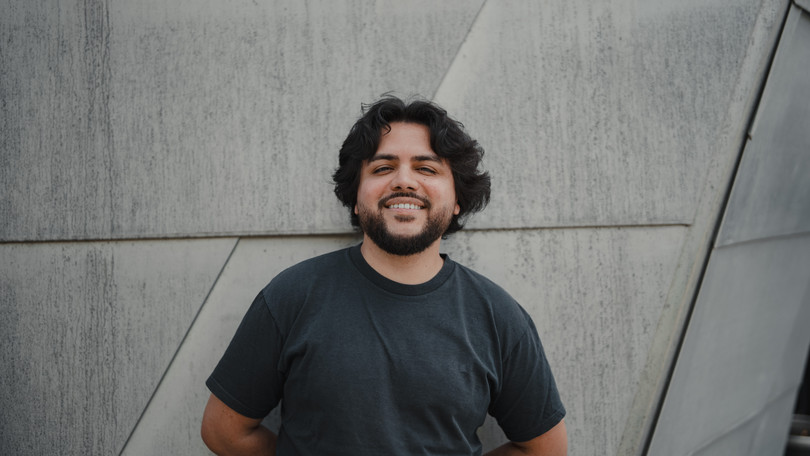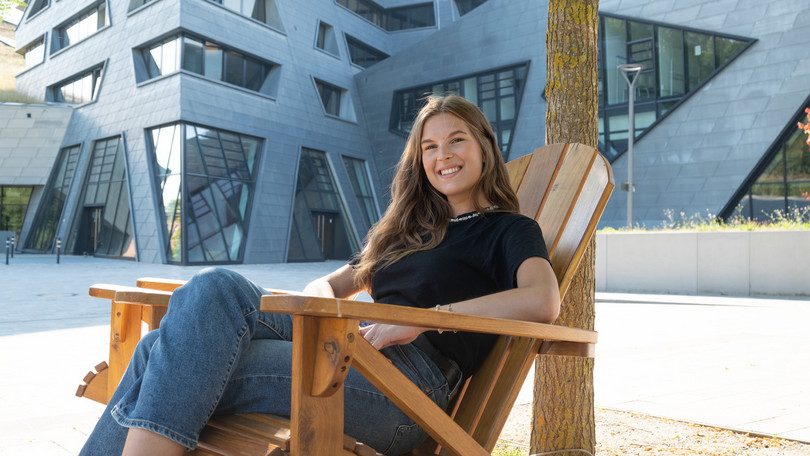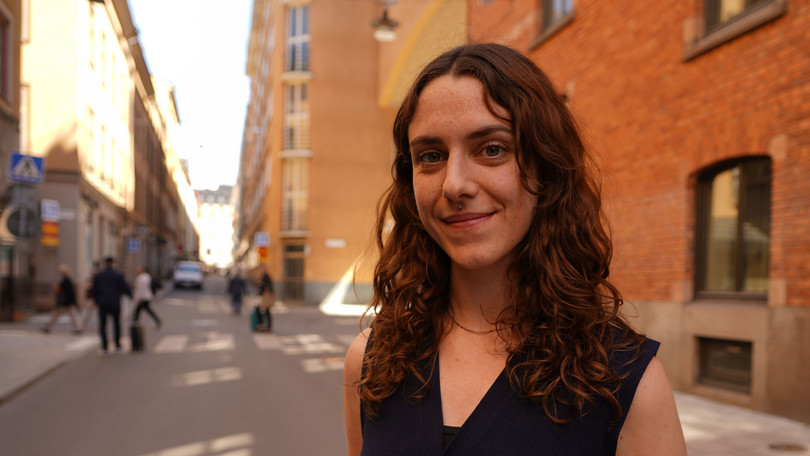Student and Alumni experiences - Media and Digital Cultures
On this page you find experiences of current and former students about the Masters Media and Digital Cultures at Leuphana Graduate School.
22.10.2025 After completing his bachelor's degree at Leuphana, Eduardo decided to pursue a master's degree in “Media and Digital Cultures”. Following graduation, he intends to do his doctorate at Leuphana while continuing his career as a film actor.
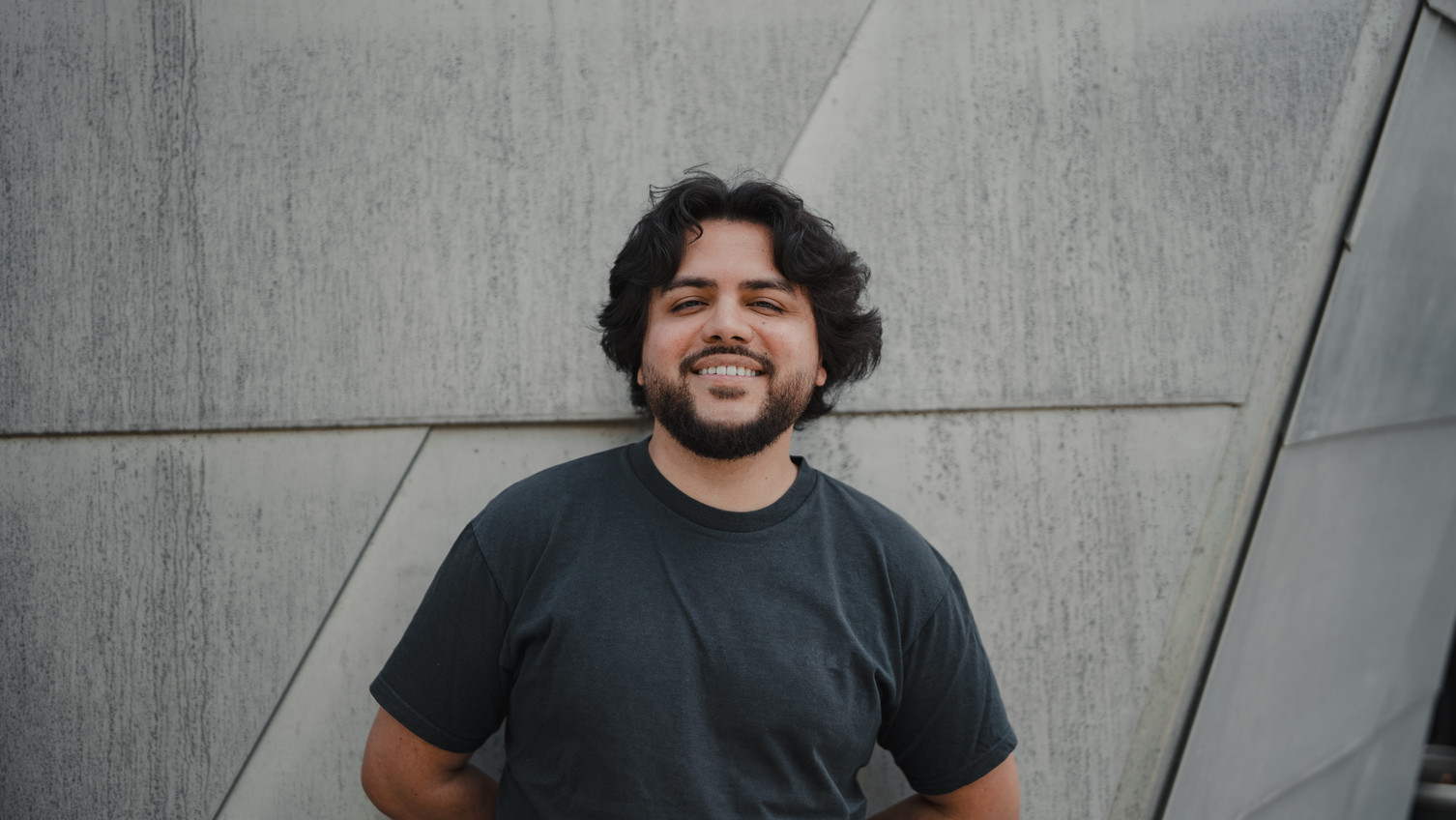 ©Privat
©Privat
What brought you to Leuphana, or what particularly impressed you about the university?
Firstly, I should mention that I completed my Bachelor's degree in Cultural Studies and Philosophy here. Back then, the focus was on media and cultural technology, which is very similar to the master's programme. The main reasons I chose Leuphana were that the university already had a good reputation, particularly in cultural studies, and that I wanted to stay close to my family in Lüneburg.
Why did you decide to study Media and Digital Cultures at the Leuphana Graduate School?
It was based on my own research interests, which were also evident in my bachelor's degree. You meet a lot of people again, and I think it's a gateway when you already know people and what they're working on. There are many teachers here who have helped me develop my own thoughts and interests. This was especially true for Prof. Dr. Claus Pias, whose seminars and lectures I always enjoyed very much because he covered many topics that interest me. I also feel that at Leuphana, the question of the practices of power in the media is not ignored, but that one can also think bigger. Here, you can really advance your thinking.
What is the relationship like with other students and teachers?
In my experience, the relationship between teachers and students is very personal. This is mainly because the teachers create the space for it. This is evident in the way we interact, talk to each other, and also discuss topics outside of the seminar. Overall, I have a very personal relationship with my fellow students. Some of my friends from my bachelor's program continued studying here, but I also made new friends. I was also a student assistant for Prof. Dr. Erich Hörl and Prof. Dr. Roberto Nigro for a long time and was employed at LIAS (Leuphana Institute for Advanced Studies).
What do you particularly like about the campus and the city of Lüneburg?
I think what I've always liked about the campus is that it's just so cozy. Especially because of the Mensawiese. It's just a great feeling to see people sitting and chatting there or playing volleyball and spikeball. In general, the atmosphere on campus is very nice. It really does resemble the US campuses you see in feel-good movies, especially in the summer. With the garden and the cool central building, I just find it cozy and harmonious. The same goes for this small but lovely city.
Do you already have an idea of what you want to do after your master's degree?
Yes, I live many lives, because I am also a film actor. That means I have another career alongside my academic one. These paths run parallel to each other, and the question always arises as to how long this stable balance will remain. However, I would very much like to do a doctorate in my field, preferably with Prof. Dr. Pias on the subject of cameras, surveillance, and power in the media. Of course, with an academic career, you always have to see if there are projects and funding opportunities. But I want to continue academically.
What advice would you give to new Master's students that you wish you had known at the start of your studies?
Firstly, especially if you don't have a bachelor's degree in media culture studies, it's incredibly important to understand what the term “media” means. It doesn't necessarily refer only to mass media such as newspapers and television, but to many things beyond that. Secondly, it's important to know that this degree program is about theory and not practice. It's about understanding how and why media works, and what it achieves, but not about how to produce media yourself.
Which seminars and lectures have left a lasting impression on you?
I particularly remember an AI seminar. The seminar was called “The Image of AI” and was led by Dr. Stefan Ullrich. We didn't approach the phenomenon by discussing how AI works or its circuitry, but rather by examining how society's understanding of artificial intelligence, i.e., images in a metaphorical sense, is formed. In other words, why do we think about AI in a certain way and how has AI been presented to us historically. In the seminar, we discussed Mary Shelley's “Frankenstein,” for example, and talked about anime, which depicts and addresses artificial intelligence in very different ways. Prof. Dr. Pias also gave a seminar on history that I really enjoyed and can recommend.
Paula's experiences
24.07.2023 The 24-year-old student is currently completing her Master's degree at the Leuphana Graduate School. In autumn, she will start her editorial traineeship at a daily newspaper. Interested students can still apply for Master's programmes in cultural studies at Leuphana until 31 August.
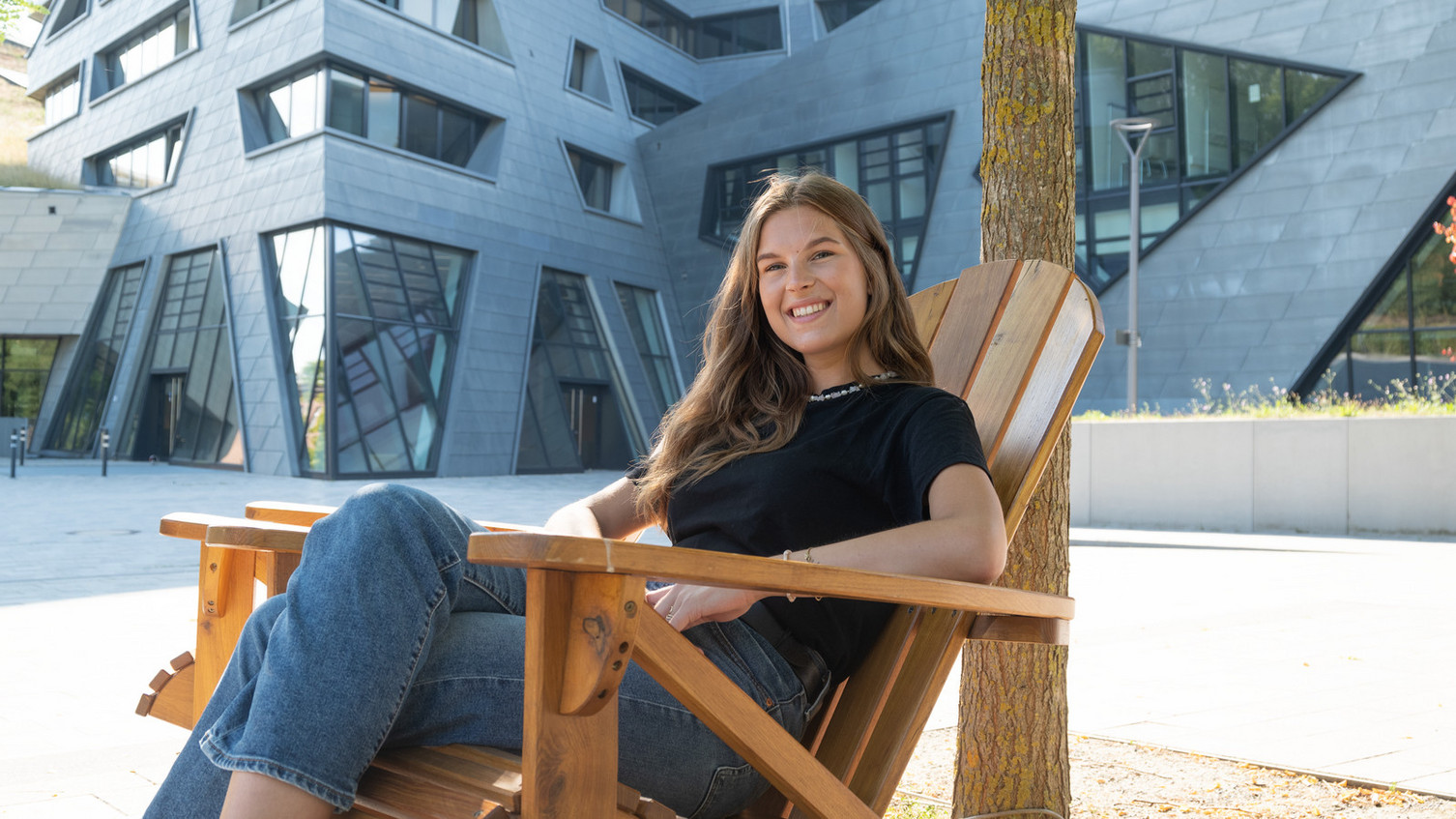 ©Anastasia Adasheva/Leuphana
©Anastasia Adasheva/Leuphana
Paula Muche spent a lot of time at her desk in the past months. Among other things, she analysed qualitative interviews and wrote reports. The first for her studies, the second for her future profession: the student is currently completing the Master's programme "Media and Digital Cultures". In autumn, she will start an editorial traineeship at the Lübecker Nachrichten. For her application, she had to prepare samples of her work - parallel to her thesis. "The past months were demanding, but the effort was worth it," says Paula Muche.
Her Master's thesis is entitled "Practices of authenticity on BeReal". The social media platform sees itself as a counter-design to the established offerings. For example, no photo filters can be used. "In my interviews, I asked users about their longing for authenticity," explains the Master's candidate: "Technical developments such as artificial intelligence, fake news or beauty filters in social media lead to many people longing for the 'real', the 'authentic' again - I could also see that in my interviews."
Paula Muche began her studies at Leuphana in 2020. But she had known the university for some time: "My cousin studied in Lüneburg. Leuphana's sustainable and innovative concept piqued my interest. When I saw that with the cultural studies Master's programme "Media and Digital Cultures" there was a study programme that combined my focus from the Bachelor's programme and where I could devote myself to questions of media change and the accompanying social changes from a cultural studies perspective, I applied," she recalls.
Previously, Paula Muche had completed a double Bachelor's degree in Communication and Media Studies and Cultural Studies at the University of Bremen. With her studies in Lüneburg, however, she was not only able to combine the fields of media and cultural studies. Among other things, the university radio station Katerfrühstück, a department of the AStA, also offered the student the opportunity to go into media practice: "Just recently, the Katerfrühstück editorial team attended a speech training course for aspiring radio hosts," Paula Muche reports.
Through her experience with the programme "Katerfrühstück" (Hangover Breakfast), she soon gained a foothold at public broadcaster NDR. At the beginning, she assisted in research and production, among other things: "For a few months now, I have been working there as a freelance reporter and am responsible for my own reports and stories," says the Master's candidate.
During her studies, it was important for Paula Muche to gain practical experience in her future professional field: "At Leuphana there are many opportunities to get involved," says the student. She is a student assistant in university communications. There she assists with social media, among other things, maintains the website and also writes reports for the internet presence.
Her studies helped her to take a broader perspective and understand theoretical backgrounds: "Indeed, the studies offered me the opportunity to look at different aspects of digitalisation with interdisciplinary methods and approaches. I would recommend the Media and Digital Cultures programme to anyone who wants to critically examine the culture-generating influence digital media have on our everyday lives. The study programme is broad and, from my point of view, demands the ability to reflect, think critically and creatively, as well as the willingness to show initiative," says Paula Muche.
Author: Dr. Marietta Hülsmann
17.08.2022 Paula Muche has followed her cousin to Leuphana and is now approaching the end of her Masters in Media and Digital Cultures. She has already immersed herself in journalistic and editorial work at various points during her studies and plans to build on her experience in this field after graduation.
Why did you choose the study programme Media and Digital Cultures at Leuphana Graduate School?
I first heard about Leuphana University through my cousin, who started her studies in Lüneburg in 2018. The university's sustainable and innovative concept piqued my interest, and the city of Lüneburg also appealed to me as a place to study. When I then saw that with the Cultural Studies Master's programme Media and Digital Cultures there was a study programme that combined my focus from the Bachelor programme and where I could dedicate myself to questions of media change and the accompanying social changes from a Cultural Studies perspective, I applied within a short time. Indeed, the degree programme offers me the opportunity to look at different aspects of digitalisation using interdisciplinary methods and approaches.
What did you study before starting your Masters degree at the Leuphana Graduate School?
From 2017 to 2020, I did a double Bachelor degree in Communication and Media Studies and Cultural Studies at the University of Bremen. During this time, I mainly studied the concept of "Deep Mediatization", which examines the interaction of media and social change. In the Masters programme at Leuphana, I saw an opportunity for me to combine both fields - Media Studies and Cultural Studies - and thus to look at the phenomenon from a Cultural Studies perspective.
During your studies, you have the opportunity to choose between different modules and set your own focus. Which modules did you choose? What do you mean by these?
Two seminars from the elective area have remained particularly positive in my memory. Firstly, in the module "Organization: Structure, Power, Economies", I attended a seminar entitled "Emotional Technologies". In the seminar, we critically examined the current development of Emotional Artificial Intelligence, i.e. technologies that aim to analyse and, in some cases, even influence the feelings of their users. We read various philosophical and historical texts and discussed them using different, concrete examples.
Another elective seminar I took in the module "Crises and Ruptures in a Global Context" was about the so-called platform economy. We looked, mostly from a sociological perspective, at the ways in which the big internet companies like Amazon, Google, Facebook and Apple influence the global economy and change state control strategies in the process. Although - or perhaps because - I had little contact with the economic aspects of the rise of these leading internet companies in my previous studies, this seminar was very enriching for me.
Leuphana sees itself as an inter- and transdisciplinary university. The orientation of your study programme is also interdisciplinary. How do you perceive this?
During the past four semesters that I have spent at Leuphana so far, I have not only learned a lot of new things in the field of Cultural Studies, but have also become acquainted with theories from history or sociology, for example. Each of the students and lecturers brings their own disciplinary background, and in the seminars, we then have the chance to share our ideas, approaches and previous knowledge with each other - even if this sometimes goes beyond the seminar description. In the process, I have experienced that all participants are open and grateful for the most diverse possible ways of looking at things and perspectives, and I have really come to appreciate this.
The Cultural Studies Integration Modules bring together students from all Master's programmes at the Faculty of Cultural Studies. How have they experienced these parts of the degree?
I found it an enriching experience to get to know students from the other Cultural Studies Masters programmes, and their academic interests and backgrounds. In part, I was positively surprised at how different the focal points and topics are that we Masters students deal with. For example, approaches from philosophy, art studies, literature, sociology, media studies and sometimes also from areas such as education or economics come together, which helps enormously to broaden one's own horizons and, for example in discussions or group work, to leave one's own comfort zone.
What is the relationship like among the students and with the lecturers?
The students treat each other in a friendly manner, with respect and mutual interest. Because, with a few exceptions, the courses take place in the form of smaller seminars, you get to know the lecturers more quickly than is the case at large universities. As a result, the interaction with each other is quite personal and there is a pleasant and open atmosphere in the seminars.
What keeps you busy besides your studies?
On the one hand, I work as a student assistant in Leuphana's university communications department. There, I write articles for the university homepage, manage central websites and prepare social media posts for the Leuphana Instagram account. On the side, I have been working as a freelance social media editor for various institutions for several years. I advise smaller companies on setting up a social media presence and create photographs, videos and texts for their online presence. Since my first semester at Leuphana, I have also been an active member of the AStA radio station unit "Katerfrühstück". In the unit, we produce a one-hour programme every fortnight during the lecture period, which is broadcast live from the studio of the citizens' radio station Radio ZuSa, which is located directly on the Leuphana campus. Until recently, I was the administrator of the AStA radio station unit for a year, where I planned and moderated our editorial meetings, took responsibility for broadcasting and did public relations work, for example. During my studies at Leuphana, I also completed a voluntary three-month internship in the local editorial office of a daily newspaper for further career orientation and to learn practical journalistic skills, and I will start another internship at another daily newspaper in September.
How do you like Lüneburg as a place to live and how do you spend your free time here?
I like Lüneburg very much as a place to live. I grew up not far from here, in the Heidekreis, so I already knew the city a little. What I like about Lüneburg is the beautiful architecture, the committed people, the many nice pubs and cafés and also the good connections to Hamburg. Overall, the atmosphere here is just very warm.
Interviewer: Jonas Kernein
Jonas' experiences
08.03.21 The 24-year-old is in his first semester of the Master's programme "Cultural Studies: Media and Digital Cultures". As a student assistant, he is helping to organise the Graduate School's digital Masters Information Day on 18 March.
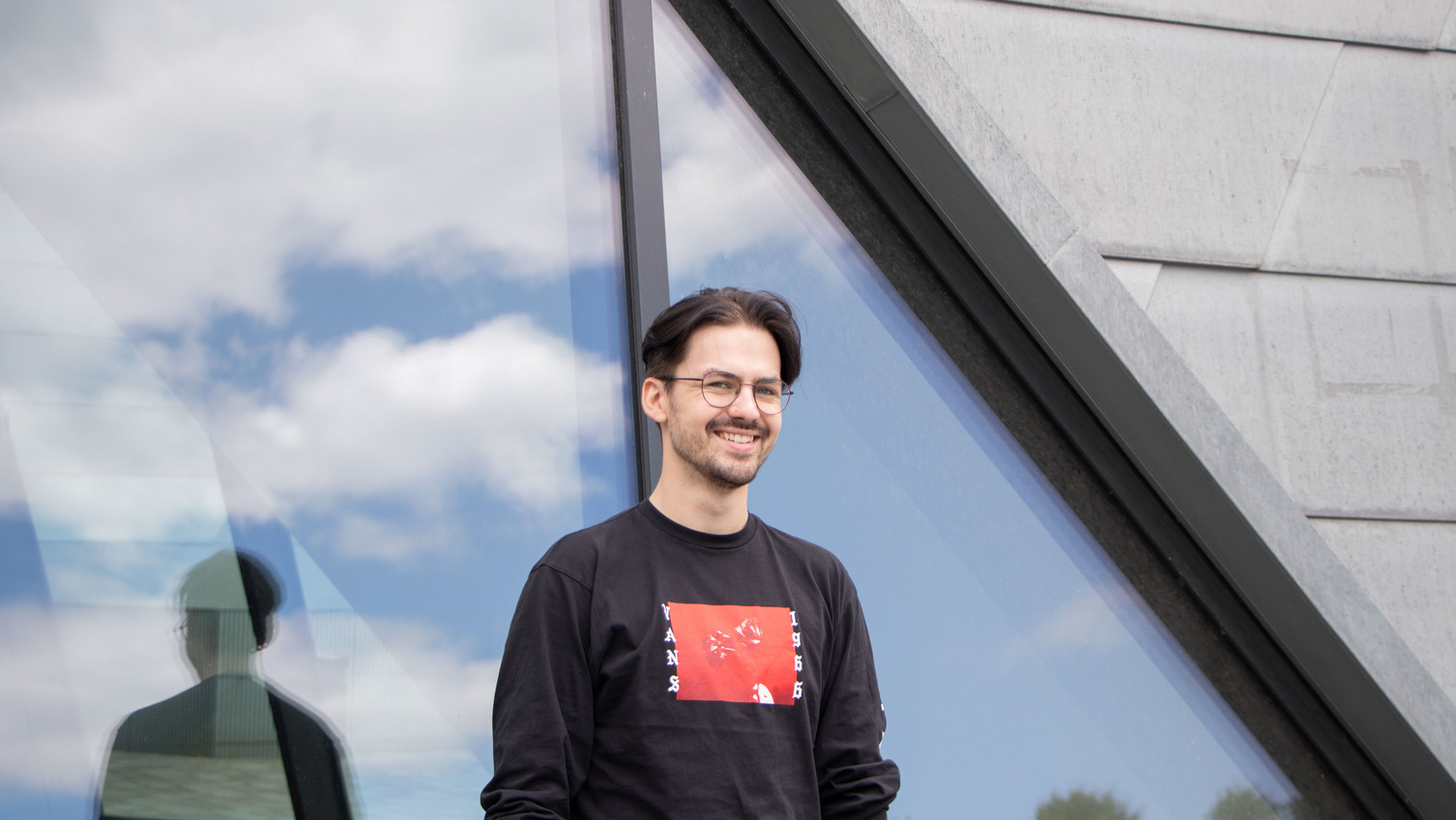 ©Anastasia Adasheva/Leuphana
©Anastasia Adasheva/Leuphana
Jonas Kernein first heard about Leuphana in a youth club in Nienburg an der Weser. A local rock group playing there had won the band contest at the lunatic Festival at Leuphana. "After that, I went to the festival with friends. It was very different from the other concerts I had attended until then: more sustainable and organised by students." Jonas Kernein became curious, found out about the study model at Leuphana and learned that the festival was accompanied by a seminar in the Complementary Studies programme: "I would like to work in cultural organisation or marketing later. The possibility of combining practice and academic theory is exciting for me." In the meantime, Jonas Kernein has co-organised several lunatic festivals and has his Bachelor's degree in the bag. Now he is studying the Master's programme "Cultural Studies: Media and Digital Cultures" in the first semester and is helping to organise the Graduate School's Master's Information Day on 18 March as a student assistant. "For me, Leuphana was the right choice. There are a lot of opportunities to get involved here and we are a good community. That's why I stayed here after my Bachelor's degree." Jonas Kernein is able to put his experience in event organisation to good use in the preparation of the Master's Info Day and, among other things, he takes care of the maintenance of the website and social media channels and is the student contact person for external partners.
He wrote his Bachelor's thesis on digital music media and their influence on Fidelity. "My Master's programme follows on from this thematically. I like the modern approach. We deal with cultural theory, among other things, but the topics almost always have to do with my life world." Jonas Kernein is interested in contemporary and pop culture, among other things, and most recently completed an internship at a well-known hip-hop magazine in Hamburg. "I would like to work in the music industry later," says the student. That's why he is deepening his studies in Sound Studies: "I already took additional courses on music and auditory culture in my Bachelor's degree. I find many intersections between music and media in my studies. For me, Lüneburg is a real upgrade."
Author: Dr. Marietta Hülsmann
Diana's experiences
26.05.2025 The 30-year-old alumna completed her Master's degree at the Leuphana Graduate School in 2022. After graduating, she worked in the Literature & Translation Promotion department at the Goethe Institut in Sweden. In 2024, she collaborated on the project "Vorzeichen: Who, What, How to Read", which focused on critically examining the German literary canon.
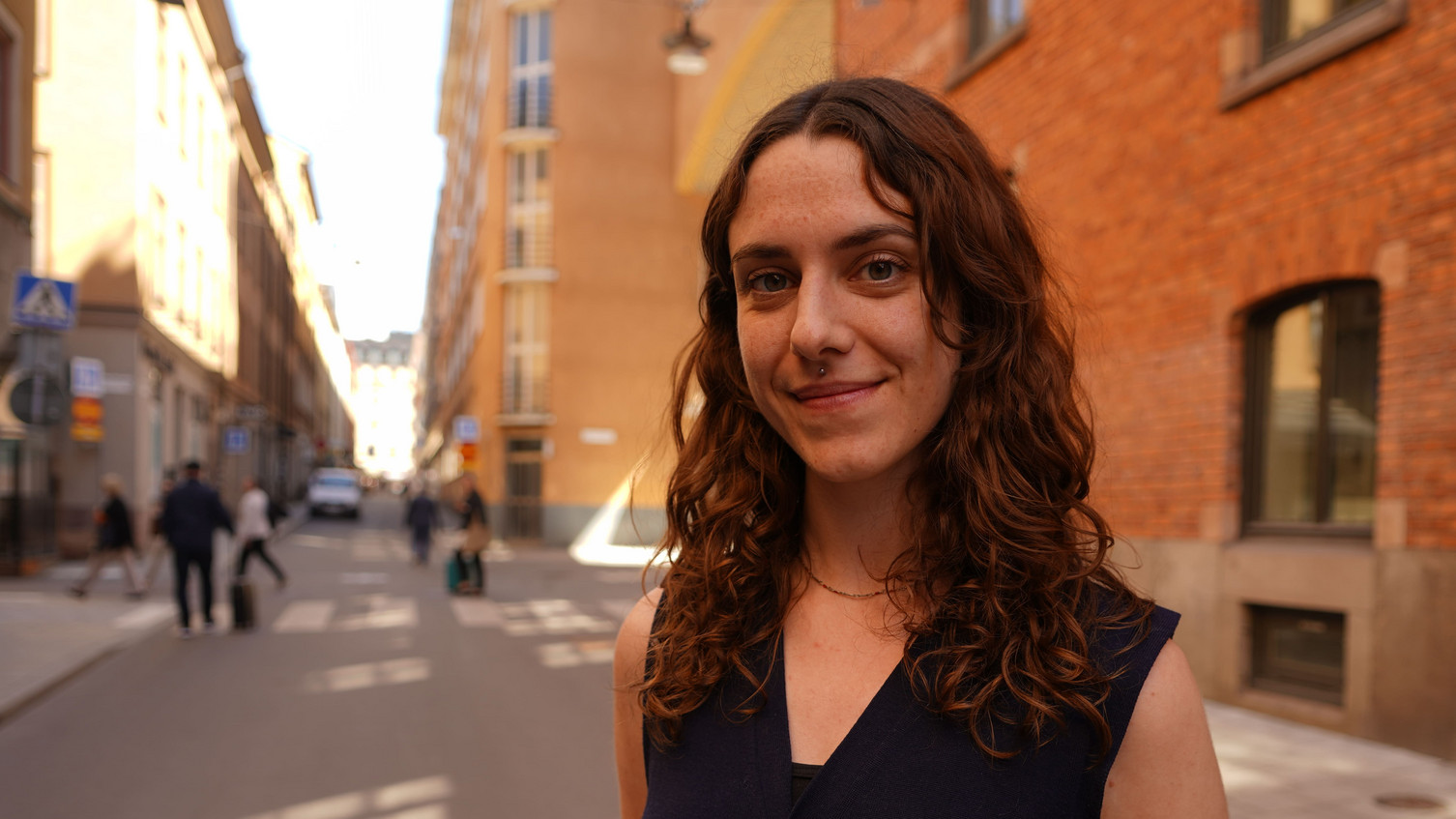 ©Privat
©Privat
What brought you to Leuphana or what particularly convinced you about the university?
Friends recommended Leuphana to me, as some of their acquaintances had studied there. I was especially drawn to the system of Majors and Minors, and I found the courses in Cultural Studies particularly appealing.
Why did you choose the Media and Digital Cultures programme at Leuphana Graduate School?
I was looking for a programme that would build on my previous Bachelor’s degree in Media Studies & Hispanic Studies, but also offer many new perspectives. Media and Digital Cultures seemed like the perfect combination of media and cultural studies, both of which I had touched on in Hispanic Studies. The Minor in “Fields of Practice in the Arts” also allowed me to explore my interest in art, which previously hadn’t found a place in my academic journey. I was incredibly happy about that.
What did you study in your Bachelor’s degree and were you able to build on it in this programme?
In my Bachelor’s, I studied Media Studies and Hispanic Studies in a dual-subject degree at the University of Bonn. I was able to build on some of the theoretical and methodological content in the Master’s programme at Leuphana, though only to a fairly basic extent. I actually liked this, because I wanted to dive into many new theories and consciously face open questions. In other words: I was looking for an intellectual challenge—which I found in the Master’s program—without feeling overwhelmed.
Were your expectations of the programme and the university met?
Yes, and in some respects even exceeded. After taking a year off between my Bachelors and Masters to do internships, I was—as mentioned—looking for an intellectual challenge, which I definitely found at Leuphana. I rarely felt underchallenged and never overwhelmed, which was a great gift for me, as these perceptions are highly individual. I clearly remember one of my first seminars, where I noticed that almost all of the students had prepared the readings and were genuinely excited for the discussion. The instructors reflected the same positive attitude, showing a genuine interest in engaging with the students. That was something I had rarely experienced at a large university like Bonn.
What was your relationship like with other students and instructors?
I started my studies in the winter semester 2019/20, so only my first semester took place on campus. Because of this, relationships with fellow students and instructors didn’t develop in quite the same way I had experienced at my previous university. Overall, though, I found the atmosphere to be consistently collegial, supportive, and constructive, which I really appreciated. In this regard too, I noticed a positive difference between a large university like Bonn and a smaller one like Leuphana.
What was the topic of your Master’s thesis?
I wrote my thesis in the field of art sociology, a discipline within sociology that I hadn’t been familiar with before the Masters. But I was excited about it from my very first term paper! My thesis is titled: “Transformation of the Art Field through Blockchain Technology? A Study of Contemporary Art Collectors in Light of the Rise of Crypto Art.” At first, I had absolutely no interest in working on a “hype” topic. But as I worked on it, I began to see the deeper questions it raised—questions that are central to the field of art (and art sociology): value, provenance, and originality.
What happened after your Masters?
While working on my thesis, I moved to Stockholm for an internship at the Goethe-Institut Sweden in the department of Literature & Translation Funding. I really enjoyed the work and was able to build a great relationship with my colleagues, which led to further job opportunities at the institute. In addition to working in the in-house library, I was employed in 2024 as a project assistant for the project “Vorzeichen. Wen, was und wie wir lesen” (“Presignals. Who, what, and how we read”), which critically examined the German literary canon. I also began a PhD in Sociology at the Düsseldorf Art Academy in the winter semester 2023/24. My dissertation essentially expands on a broader question from my Master’s thesis (working title: Structure and Dynamics of the Art Field under the Influence of Digital Technologies – A Study of Blockchain Technology in Art).
Was there a module or seminar that particularly stood out to you?
That’s actually not easy to answer, since I have many positive memories. But among my favorites were: Art Fields in Contemporary Capitalism, Benjamin and Adorno on Literature and Media, Grey Media, Technology and Time, Contemporary Media Philosophies, Media Cultures of Computer Simulations, Right to the City: Space, Conflict, Urban Culture, Recent Publications in Digital Cultures, and various research seminars.
Would you recommend your programme to others?
Absolutely!!
Did you do a semester abroad? If so, where did you go and what did you particularly enjoy about it?
I had been accepted for a semester abroad in Zurich. Due to the pandemic, however, I ultimately decided against it. That said, I would definitely recommend doing a semester abroad!
Contact and Counselling
First contact point
The Information Office (Infoportal) is your contact point for
- general information on the application procedure
- initial questions about the study programmes offered at Leuphana
- making an appointment with the Graduate School Student Counselling Service.
Information Office
Building 8, Ground Level
Fon +49.4131.677-2277
studierendenservice@leuphana.de
Campus opening hours
Mon - Thu 9.00 am - 4:00 pm
Fr 9.00 am - 12 noon
Student Counselling
To make an appointment with our Student Counselling Service, please use our booking tool on our website.

